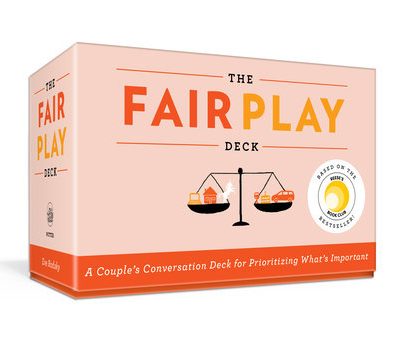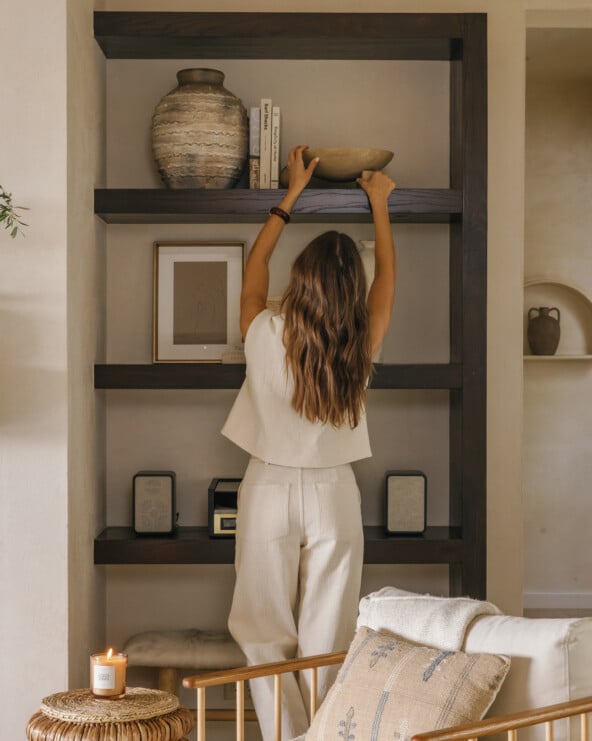When it comes to building healthy relationships, there’s an abundance of advice—some will resonate, and some won’t. Remember: every relationship is different! But in all relationships, both parties should feel respected, cared for, and supported. That’s why, if you’re familiar with the Fair Play method, you’ll know it can be an absolute game changer for dividing household tasks evenly based on your needs. And if you haven’t heard of it yet? Buckle up ’cause we’re about to deep dive.
If you read my recent article about the mental load, consider this the sequel! I received so many notes from readers who resonated with the idea of helping mothers recognize the signs of burnout before it’s too late. Now, it’s time to navigate many of those topics with your partner using the Fair Play method.
Image above by Michelle Nash.


What is the Fair Play Method?
The Fair Play method is defined as a system that helps you and your partner create a collaborative and equitable partnership. The method is based on a game created by Eve Rodsky, which has become increasingly popular among parents around the world who are looking to divide household tasks evenly based on what each parent is best at and has the time for. The key part? The goal is to do so—without any resentment.
I find that a visual representation of the work each person in the family is taking on is an effective way to open everyone’s eyes to each other’s responsibilities. I often hear of partners who defensively proclaim “I do help!” and begin to rattle off the list of tasks they do. The result, I’ve found, is that this usually leads to an argument. In the moment it can be hard to gather all the tasks you do, especially as the mother where most tasks are unseen.
A recent example in my own life was the task of creating “holiday magic.” That looks different in each home, and boy is it a ton of work. From shlepping the holiday décor out of the shed to addressing the Christmas cards and planning social dates to seeing Santa. (Not to mention cleaning it all up come January.) By the end of the season, this mama was spent.


Playing the Fair Play Method
The Fair Play method is a deck of cards you go through with your partner. Whether you’re newly married, living in a domestic partnership, or have recently taken a shift in life roles, you will find this helpful. Here’s how it works.
- Step 1: Sit with your partner for an hour when you’re relaxed and feeling good (food and drink help!).
- Step 2: Lay out all the task cards, choose only the ones that apply to your family, and take turns deciding which tasks you’ll own completely.
- Step 3: Claim your Unicorn Space cards, which allow you time and space to develop and pursue activities and skills that bring you joy, whether it’s learning a new language, playing music, or training for a marathon.


Key Takeaways From the Fair Play Method
Conception, Planning, and Execution
There are several things that stood out when Tyler and I did this exercise. First of all, owning a task completely means that it’s yours from start to finish and the other partner should never have to be asked or nagged to do it. The deck defines it as conception, planning, and execution.
Minimum Standard of Care
Another standout realization was about the tough conversations that come with creating a minimum standard of care. Let’s be honest, we’ve all experienced that moment when we ask our partner to do something, but when they do it, it’s not to our standards. So with a huff and puff, we redo it behind their backs. In the end, no one wins.
Instead, talk about what a minimum standard of care looks like. For example, Tyler owns the grocery shopping and our minimum standard of care is that the haul includes healthy options for the family and specific snacks for the kids. Another standard is that we goes to the grocery store two times a week on the same days so we both know the fridge is alway full. Once we were able to establish the items we always need, I never felt annoyed when he went shopping again.
Now, here is the tricky part: once you establish that minimum, you need to give your partner the freedom to do it with their own approach. If your partner takes on the laundry and their folding isn’t how you would do it, but it still works, let it go! You can’t release your load if you’re always trying to micro-manage. Let dad do it dad-style. Perfectionism is a trap, and identifying a standard will give you freedom and flexibility.
Disclaimer: Not every card in the deck is going to be aligned with your family values. You may need to add a few cards to the deck! For example, I wanted to add “packing the diaper bag” or “prepping the bag to leave the house with the kids.” Doing so created a personalized experience that was relevant to our family.


Beyond the Fair Play Method
So, what happens after the game? Is that the end of the struggle? Absolutely not. There will come moments of self-reflection even after you’ve done the exercise. This is healthy and encouraged!
Here is a situation I found myself in after diving into the Fair Play method. Though Tyler and I agreed to a 60/40 split, I was still feeling some resentment over the amount of labor I was doing, despite having agreed to it. For me, I realized that two things were missing. The first was recognition—truly feeling valued after all the hard work I put in. Once again, society and so many people don’t recognize or appreciate women’s unseen labor or the value it adds to a family’s life. So, I asked Tyler to recognize me more and tell me how much he values my labor. He agreed, and things have been great since.
The second part was incorporating common sense. If you have nothing going on and you see your partner working their butt off while you’re chilling, why not ask a simple “How can I support you?”
Most of the time, I’m not going to want his help. I like putting out all the holiday décor, but being asked makes me feel seen. And sure, maybe I’ll ask you to bring the empty bins to the garage, but that same task reflects what it means to be in a partnership. Sometimes, we share each other’s load.
I highly encourage partners around the world to give this method a shot! It truly has helped diminish resentment in my household and ease my mental load. It’s my hope that it will do the same for you.







